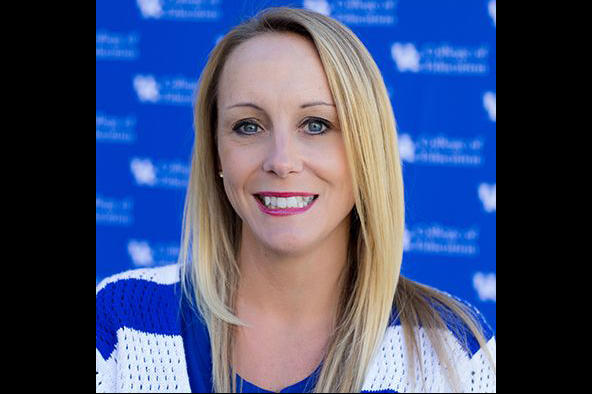Health Promotion Faculty Member Helps Address E-Cigarette Use Among College Students

Designed to help higher education institutions address the use of e-cigarettes and vaping products on campuses, a new white paper published by the American College Health Association provides expert advice from University of Kentucky faculty member Melinda Ickes.
The paper was proposed and co-authored by Ickes, an associate professor of health promotion and director of graduate studies in the UK College of Education Department of Kinesiology and Health Promotion. Ickes worked collaboratively with co-authors Jennifer Cofer, of University of Texas MD Anderson Cancer Center; Thomas Hall, of the Orange County Government Drug-Free Office; and Delynne Wilco, of University of Alabama. The paper was published through the Alcohol, Tobacco, and Other Drugs Coalition of the American College Health Association.
Ickes reinforced the important role college campuses have, “Traditional cigarettes are no longer the most popular tobacco product among this age group. E-cigarettes and vaping products are now most common among young people who choose to use tobacco. I wanted to publish this white paper through the American College Health Association to help reach those who work with college students so they can help take action and make a difference. By providing students with prevention information and evidence-based treatment, we have the opportunity to help them live healthier lives."
As an associate professor of health promotion, Ickes works with students who are preparing for careers where they help empower others to live healthier lives. She works with both undergraduate and graduate students who are majoring or minoring in health promotion, and those who are pursuing a graduate certificate in health coaching. The programs cover topics such as human health and wellness, drug education, nutrition, sexuality education and program planning in health education.
With a degree in health promotion, graduates can:
-
take the Certified Health Education Specialist (CHES) exam;
-
work in hospitals, health departments, worksite wellness, state or national agencies and organizations, or other similar settings; and
-
apply to graduate schools in health-related areas of study.
According to Ickes, “One of the things I enjoy most about our health promotion programs is the opportunity to encourage students to get involved in research and community-engaged experiences.”
Ickes has extensive experience in college and youth health promotion, including tobacco prevention, and has worked with university and community partners to reduce the prevalence of emerging tobacco products among at-risk youth and young adults.
She has a joint appointment in the UK College of Nursing where she serves as co-director of the Tobacco Policy Research Program of the BREATHE (Bridging Research Efforts and Advocacy Toward Healthy Environments) research team.
Ickes serves as director of both Tobacco-free Take Action! and Go Tobacco-free, two initiatives to promote evidence-based tobacco control, including implementation and evaluation of tobacco policies. Through these initiatives, Ickes and her colleagues have assisted over 500 campuses and organizations working toward tobacco-free policies.
She is also program director of #iCANendthetrend, a peer-led youth prevention and empowerment program that has reached thousands of Kentucky youth and has been recognized nationally.
Ickes’ research interests go beyond tobacco control, including community-engaged research, youth empowerment, evidence-based program planning and evaluation, college health promotion, physical activity promotion and childhood obesity.
For more information about her work in tobacco prevention programs or to learn about degrees in the health promotion field, contact her at melinda.ickes@uky.edu.
Credits
Amanda Nelson (College of Education)
